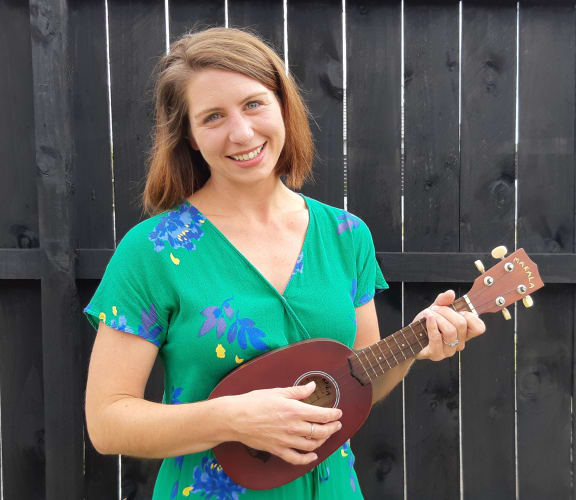Music Therapy New Zealand has launched its annual awareness campaign to celebrate and promote the work done by Music Therapists across Aotearoa.
The campaign highlights the growing role of music therapy in the mental health sector, and the benefits that professional music therapy can have on the wellbeing of our communities.

Music therapist Rachel Foxell Photo: Grace Shelley
Rachel Foxell is one of the 73 people currently registered as a Music Therapist in New Zealand.
She studied flute at university but became interested in music therapy while working as a teacher aide for a young boy with a brain injury, noticing that he wanted to join in when the other students were singing together.
It was a light bulb moment for Rachel. “I thought, there’s something here about the way that music is motivating him and enabling him to connect with his peers. I started looking at how music can help people with disabilities and that’s when I stumbled across music therapy.”
Rachel went on to study for a Master of Music Therapy at the University of Melbourne. She says the training is both practical and theoretical and relies on having some sort of musical competency.
“We had to learn about the brain, about psychology, and also about different models of special education; then we had to learn how to apply that to how music impacts on the brain and the body.”
Rachel is passionate about using music to help people achieve their full potential in non-musical areas. Her work takes her into many different environments working with children and adults from across the community.
“In my typical week I work for a few days at a special school for children with disability, like children with autism, children with cerebral palsy, or developmental delay. I use songs to develop communication, eye contact; also gesturing, waiting and listening. It all builds confidence.”
She also works in a hospital with older adults with mental illness, using music in a way that will stimulate feelings of well-being. She says even people with advanced dementia can come to life because of music therapy.
“Sometimes I will walk in, having never met this person before, but I will start playing a song that they had at their wedding and they’ll open their eyes and look at me, possibly the first time they’ve made eye contact all week, and those moments of connection are so valuable… and that’s what music therapy can offer.”
To celebrate Music Therapy Week, 27 of our Registered Music Therapists have united to create a virtual choir to celebrate their use of tele-health in Music Therapy during the covid-19 pandemic.
Music Therapy Week 2020 runs October 19-25.
Related links:
Infographic: the neuroscience of music - learn more about how the brain processes music and why music therapy works.
Secret Life of Music Therapists
Claire Molyneux - Music Therapy
New research shows music therapy helps children with autism
How music therapy can help heal the mind

